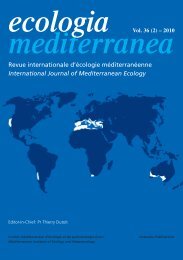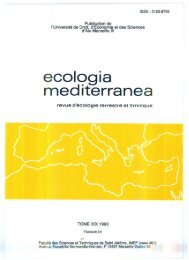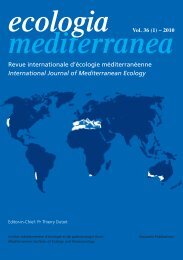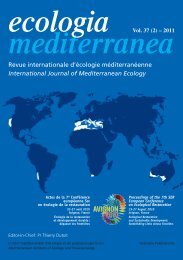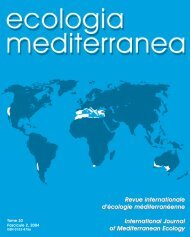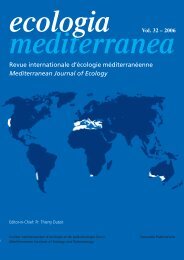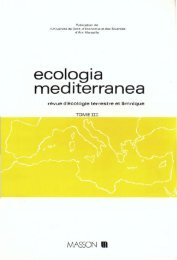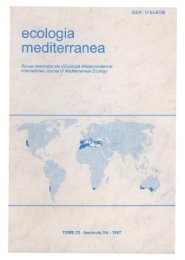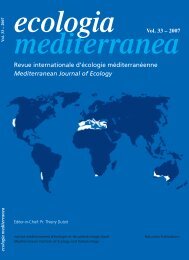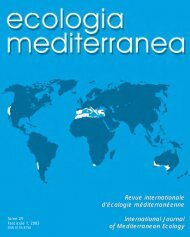Vol. 35 – 2009 - Ecologia Mediterranea - Université d'Avignon et des ...
Vol. 35 – 2009 - Ecologia Mediterranea - Université d'Avignon et des ...
Vol. 35 – 2009 - Ecologia Mediterranea - Université d'Avignon et des ...
Create successful ePaper yourself
Turn your PDF publications into a flip-book with our unique Google optimized e-Paper software.
Annonce de colloque international<br />
7 e Congrès européen SER<br />
d’écologie de la restauration<br />
23-27 août 2010<br />
Palais <strong>des</strong> Papes, Avignon, France<br />
Écologie de la restauration<br />
<strong>et</strong> développement durable<br />
Établir <strong>des</strong> liens<br />
transfrontaliers<br />
Objectifs du congrès<br />
L’objectif principal du congrès est de présenter <strong>et</strong> d’évaluer<br />
l'état de l'art dans le domaine de la restauration écologique <strong>des</strong><br />
écosystèmes <strong>et</strong> de rassembler <strong>des</strong> scientifiques, <strong>des</strong> décideurs<br />
<strong>et</strong> <strong>des</strong> praticiens pour <strong>des</strong> échanges mutuels afin de créer <strong>des</strong><br />
synergies dans les proj<strong>et</strong>s futurs de restauration écologique. Par<br />
<strong>des</strong> présentations orales, <strong>des</strong> ateliers, <strong>des</strong> sessions d'affiche <strong>et</strong><br />
<strong>des</strong> excursions, le congrès offrira une occasion unique pour <strong>des</strong><br />
contacts transfrontaliers <strong>et</strong> <strong>des</strong> échanges de connaissances,<br />
d’expériences <strong>et</strong> de pratiques dans le domaine de la restauration<br />
écologique : un champ émergent <strong>et</strong> une profession au carrefour<br />
de l’écologie appliquée, de l'économie environnementale<br />
<strong>et</strong> <strong>des</strong> sciences socioculturelles.<br />
Thèmes du congrès<br />
Restauration d’écosystèmes<br />
• Pelouses sèches, lan<strong>des</strong>, garrigues, maquis, végétation steppique<br />
<strong>et</strong> semi-aride<br />
• Marais, tourbières, prairies humi<strong>des</strong><br />
• Lacs, étangs, oueds, rivières <strong>et</strong> estuaires<br />
• Écosystèmes marins <strong>et</strong> côtiers<br />
• Forêts <strong>et</strong> boisements<br />
• Habitats rocailleux<br />
• Sites industriels pollués comme les mines, les décharges, <strong>et</strong>c.<br />
Fragmentation <strong>et</strong> connectivité<br />
dans les réseaux de sites protégés<br />
• Quelle densité pour les réseaux de sites protégés <strong>et</strong> quel<br />
niveau de connectivité ?<br />
• Actions de restauration écologique transfrontalière dans le<br />
Bassin méditerranéen<br />
• Impacts attendus <strong>des</strong> changements climatiques <strong>et</strong> actions<br />
possibles<br />
• Impacts attendus <strong>des</strong> invasions d’espèces exotiques <strong>et</strong> actions<br />
possibles<br />
La restauration comme constructeur de pont<br />
entre conservation de la nature<br />
<strong>et</strong> développement économique local durable<br />
• Contraintes socio-économiques, avantages pour financer <strong>des</strong><br />
proj<strong>et</strong>s <strong>et</strong> <strong>des</strong> solutions pour promouvoir <strong>et</strong> supporter <strong>des</strong><br />
activités de restauration écologique<br />
• Contraintes légales <strong>et</strong> solutions pour une restauration écologique<br />
réussie<br />
• Améliorer la collaboration entre scientifiques, décideurs <strong>et</strong><br />
praticiens en Europe <strong>et</strong> dans le Bassin méditerranéen<br />
• Mesures légales pour faire face à la perte de techniques <strong>et</strong><br />
savoirs traditionnels de gestion conservatoire<br />
ecologia mediterranea <strong>–</strong> <strong>Vol</strong>. <strong>35</strong> <strong>–</strong> <strong>2009</strong><br />
Announcement of an international congress:<br />
7 th SER European Conference<br />
on Ecological Restoratoion<br />
23-27 August 2010<br />
Popes’ Palace, Avignon, France<br />
Ecological Restoration<br />
and Sustainable<br />
Development<br />
Establishing Links<br />
Across Frontiers<br />
Objectives of the Conference<br />
The biological conservation and ecological restoration of natural<br />
and semi-natural habitats are both essential in Europe. The<br />
aim of the conference is to present and assess the state-of-theart<br />
in ecological restoration and to bring tog<strong>et</strong>her scientists,<br />
policy makers, practitioners and stakeholders for mutual<br />
exchange and synergy. Through lectures, workshops, poster<br />
sessions and excursions, the conference will offer an outstanding<br />
opportunity for transboundary contacts and exchanges of<br />
knowledge, experiences, and “best” or at least successful, practices<br />
in ecological restoration, an emerging field and profession<br />
at the crossroads of applied ecology, ecological and environmental<br />
economics.<br />
Themes of the Conference<br />
Restoration of ecosystems<br />
• Dry grasslands, heaths, matorrals, steppic and semi-arid veg<strong>et</strong>ation<br />
• Bogs, fens, w<strong>et</strong> meadows<br />
• Lakes, ponds, wadis (dry river beds), rivers and estuaries<br />
• Marine and coastal ecosystems<br />
• Forests, woodlands and shrublands<br />
• Rocky habitats<br />
• Industrial and polluted areas such as mines<br />
Fragmentation and connectivity<br />
in n<strong>et</strong>works of protected sites<br />
• How dense and compl<strong>et</strong>e are the n<strong>et</strong>works of protected areas<br />
and what connectivity level is needed?<br />
• Restoration actions across national boundaries in the <strong>Mediterranea</strong>n<br />
Basin.<br />
• Expected impact of climate change and possible countermeasures<br />
• Expected impact of exotic, invasive species and possible countermeasures<br />
Restoration as the bridge builder<br />
b<strong>et</strong>ween nature conservation<br />
and sustainable local economic development<br />
• Socio-economic constraints, benefits, financing opportunities<br />
and solutions for promoting and sustaining ecological restoration<br />
activities<br />
• Legal constraints and solutions for successful ecological<br />
restoration<br />
• Improving collaboration among scientists, policy makers, and<br />
practitioners throughout Europe and the <strong>Mediterranea</strong>n Basin<br />
• Policy measures to cope with loss of traditional management<br />
techniques and knowledge<br />
99



